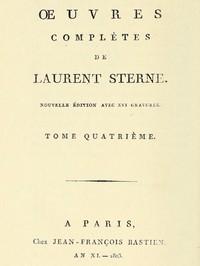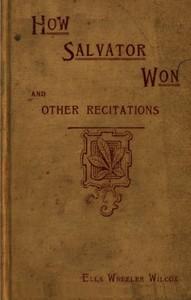Read this ebook for free! No credit card needed, absolutely nothing to pay.
Words: 17597 in 5 pages
This is an ebook sharing website. You can read the uploaded ebooks for free here. No credit cards needed, nothing to pay. If you want to own a digital copy of the ebook, or want to read offline with your favorite ebook-reader, then you can choose to buy and download the ebook.


: Oeuvres complètes tome 4 by Sterne Laurence - English fiction 18th century Translations into French; Sterne Laurence 1713-1768 Correspondence Translations into French; Sermons English 18th century Translations into French FR Littérature; FR Nouveautés
"What's the matter, child?" father said.
I tried to make myself look as pretty as possible.
THE OTHER SIDE OF THE DOOR
THE CITY
The city is always gray. Even in March, the greenest month of all, when the Presidio, and the Mission Hills, and the islands in the bay are beautiful with spring, there's only such a little bit of green gets into the city! It lies in the lap of five hills, climbing upward toward their crests where the trees are all doubled and bent by the trade-wind. It seems to give its own color to the growing things in it. The cypress hedges are dusty black; the eucalyptus trees are gray as the house fronts they knock against, and even the plaza grass looks dark and old, as if it had been the same grass always, and never came up new in the spring.
But for the most part there are no trees, and only the finest places have gardens. There are only rows and rows of houses painted gray, with here and there a white one, or a glass conservatory front. But the fog and dust all summer gray these, too, and when the trade-winds blow hard it takes the smoke out over the east bay, and makes that as gray as the city.
And yet the city doesn't look sad. The sky is too blue, and the bay is too blue around it; and the flying fog, and the wind, and the strong tide flowing in and out of the bay are like restless, eager creatures that never sleep or grow tired. When I was a very little child the fierceness of it frightened me. All the noises of the city made one harsh, threatening voice to my ears; and the perilous water encompassing far as eye could reach; and the high hills running up into the sky now blinded by dust, now buried in fog, now drenched in rain, were overpowering and terrifying to me. Beyond that general seeming of terror there is little I remember of the early city, except the glimmer of white tent tops against gray fog or blue water, the loud voices in the streets, and a vague, general impression of rapid and violent changes of place and circumstance. Through their confusion three figures only, move with any clearness,--my tall, teasing, father, my grim nurse Abby, and my pale-haired mother. Indeed, the first distinct incident that stands forth from that dim background is the death of my mother.
It was a puzzle for a child. One day she was there, ill in bed, but visible, palpable, able to speak, to smile, to kiss,--the next, she had disappeared. They said she had gone away, but I knew that was nonsense; for when people went away it was in the daytime with bags and umbrellas, and every one knew they were going, and where they went, but with my mother it was different. One day she was there,--the next she was not, nor in any of the rooms of the house could she be found. It was long before I ceased to expect her back; long before I ceased, by some process of child's reasoning, to blame her departure on the gray unaccountable city. For as early as I can recall a coherent sequence of impressions the city appeared to me strange and unaccountable. There was a secret shut away from me behind every closed house front; the eucalyptus trees seemed to whisper "mystery" above my head; and at night, when the fog came heaping in, thicker than feather-beds, across the Mission, and streaming down the long hills on the heels of the wind, it brought an army of ghosts to inhabit the dark places beyond the safety of the lighted window-pane. Though I had lived among the seven hills almost all my life; and though in ways it had grown familiar, and even dear to me, yet I never seemed to grow quite used to the city. It had strange tricks of deception that were enough to unsettle the finest faith. For when I looked at it from the windows of my room under the roof it was as flat as a plate, visible in its entirety from end to end, and it was as easy to find Telegraph Hill or the Plaza upon it as it was to pick up a block from the carpet. But, when I went abroad in it, it hid away from me. It would never show me more than one street at a time, and never by any chance would it reveal to me, through the tall houses, in what part of it I was walking.
All sorts of strange and interesting things went on in the city. We could see the signals run up on Telegraph Hill when a ship was sighted. And then the "express" would go dashing furiously down some street below us, the pony at gallop; and the line would form in front of the post-office and stretch like a black snake up Washington Street. Or we watched the yellow omnibuses laboring down Washington Street like clumsy beetles. It seemed to me that a city was the most delightful and absorbing plaything a child could have, and it was a hard arbitrary blow of fate that took me from it to the convent school at Santa Clara.
But if to leave the city was hard, it was terrible indeed to leave the house, the familiar rooms, the familiar footsteps and voices that I loved, and listened for. I had never been away from father and Abby in my life, and though Hallie Ferguson and Estrella Mendez went also, I was very homesick.
There was nothing at all interesting at the convent,--nothing but pepper trees, and nun's black hoods, and books. Even when we walked out there were only the dreary Santa Clara flats with the mountains so distant on the horizon that their far-awayness made me want to cry. The only nice thing about the convent was the vacation that took us away from it, back, out of the burning summer valley to the bay, the rows of gray-faced houses, the shipping and the wind. Each time I came back it was with the rapture one must feel returning to some long left, beloved place and finding it unchanged.
The palm, the cypress hedges, the sunny conservatory, the low, long rooms beyond it, the dark hall, and narrow, precipitous stair were always adorably the same. But around them the city was growing with such speed that each time I returned I had to learn to know it afresh. Already there were several blocks of houses beyond ours, and the second year I came home from the convent Hallie Ferguson told me her father was going to move because there was a gambling-house going up across the street from them, "and build," Hallie expressed it, "in a more fashionable neighborhood."
Free books android app tbrJar TBR JAR Read Free books online gutenberg
More posts by @FreeBooks

: The Cable Game The Adventures of an American Press-Boat in Turkish Waters During the Russian Revolution by Washburn Stanley - Russia History Nicholas II 1894-1917; Black Sea Description and travel


: How Salvator Won and Other Recitations by Wilcox Ella Wheeler - Short stories American; Recitations; American fiction 19th century; American poetry 19th century






